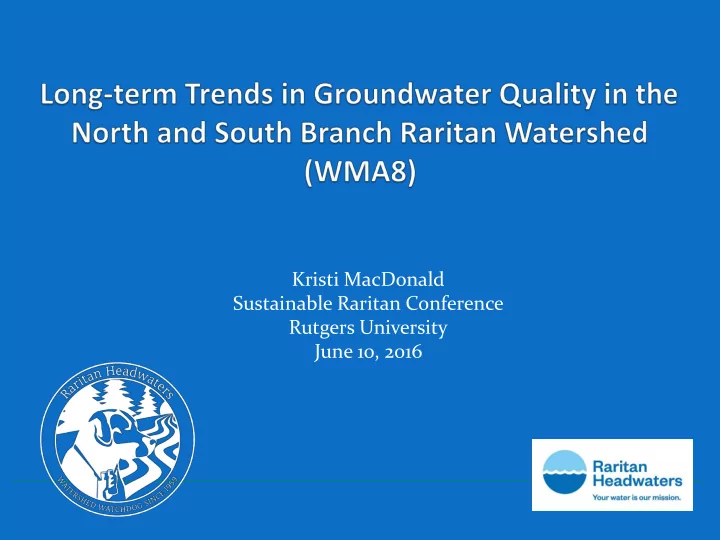

Kristi MacDonald Sustainable Raritan Conference Rutgers University June 10, 2016
RHA’s Well Test Program Established in 1974 80% of residents rely on wells Reduced cost, convenient and confidential testing Category 1 & 2 contaminants 33 municipalities (out of 39) 14,700 records in database ranging from 1984-2015
Groundwater Trend Analysis Has water quality changed over time? Do trends vary geographically? What are the possible causes of these trends in water quality? What can we do about it?
Statistical Methods Half the Reporting Limit for non-detects Parametric Tests – Linear regression on raw and log- transformed data Non-parametric Tests –Kendall’s Tau b Trend Test Significant at p<0.05
Mean Arsenic Concentration by Year Kendall’s tau correlation coefficient = 0.223, p<0.01
Arsenic Test Results 2003-2015
Potential causes of mobilization: Land use change Well drilling and pumping practices Download the Full Report at www.raritanheadwaters.org
Acknowledgements Dr. Chris Obropta, Sara Mellor, Robert Brown and students at the Water Resources Program, Rutgers AES Bill Kibler, Cindy Ehrenclou, Melissa Mitchell, Margaret Logreira, Connor Franc, Debra Dolan, Mara Tippett, Danielle Wolfrum, Kathleen Shea, and Angela Gorczyca, RHA Dr. John McLaughlin, Rutgers Harvey Klein and staff at Garden State Labs Peer reviewers: Dr. Rick Lathrop, Dr. David Robinson, Dr. Dan Van Abs, Dr. Eric Vowinkel (Rutgers) and Dr. Emilie Stander (RVCC) All the volunteers and participants in the CWT program Funded by The Leavens Foundation
Important Next Steps • More Research & Monitoring: • Mechanisms for arsenic mobilization in our region • Improved monitoring of groundwater quality and quantity • Connections between groundwater and surface water • Raise public awareness about groundwater • The need to test private wells • Regional planning, BMPs, ordinances, and regulations to protect groundwater Kristi MacDonald, PhD Director of Science kmacdonald@raritanheadwaters.org (908)234-1852 ext. 322 www.raritanheadwaters.org
Recommend
More recommend